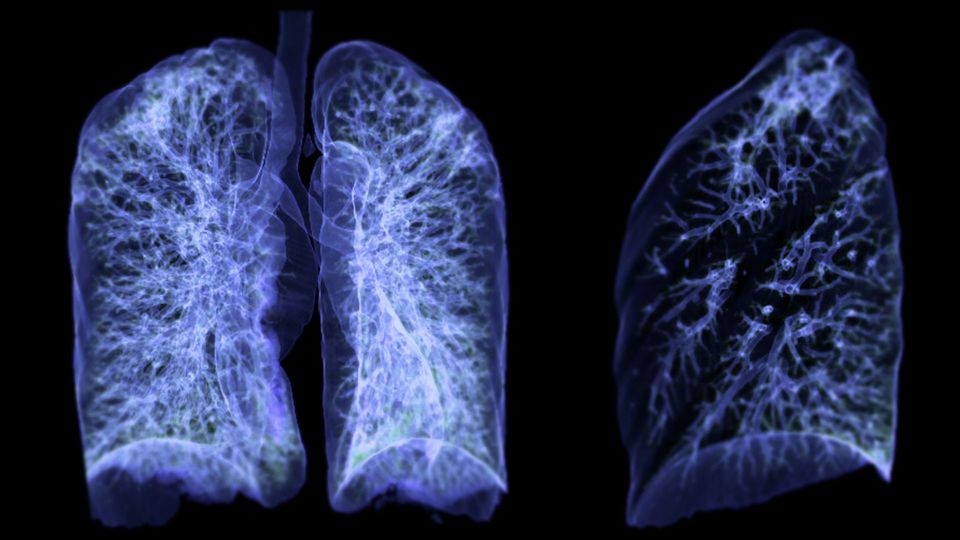AstraZeneca's Drug Approved for Treating Limited-Stage Small Cell Lung Cancer in Europe
AstraZeneca’s IMFINZITM is approved in the EU as the first and only treatment for LS-SCLC.

Complete the form below to unlock access to ALL audio articles.
AstraZeneca’s IMFINZITM (durvalumab) has received approval in the European Union as a monotherapy for treating adults with limited-stage small cell lung cancer (LS-SCLC) whose disease has not progressed after platinum-based chemoradiation therapy.
The approval follows the favorable opinion of the Committee for Medicinal Products for Human Use and is based on results from the ADRIATIC Phase III trial. The trial results were published in The New England Journal of Medicine.
SCLC is a rare and highly aggressive lung cancer
Lung cancer is the leading cause of cancer death among both men and women, accounting for about one-fifth of all cancer deaths. The cancer is broadly split into non-small cell lung cancer (NSCLC) and SCLC, with SCLC accounting for 10–15% (1–5 patients in 10,000 persons) of all lung cancer diagnoses.
SCLC is a rare and highly aggressive lung cancer, with LS-SCLC (Stage I-III) accounting for approximately 30% of SCLC diagnoses and is classified when the disease is generally only in one lung or one side of the chest.
The disease can affect anyone, but people who smoke, previously used to smoke or were exposed to second-hand smoke have an increased risk of developing it. SCLC is typically recurring and progresses rapidly despite initial positive responses to chemotherapy and radiotherapy. The prognosis of SCLC is particularly poor; only 15–30% of patients survive 5 years after diagnosis.
The ADRIATIC trial
The ADRIATIC initiative is a double-blind, randomized, placebo-controlled, multi-center global Phase III clinical trial. It evaluated the effects of IMFINZI monotherapy and IMFINZI plus IMJUDOTM (tremelimumab) treatment versus placebo in 730 LS-SCLC patients whose disease had not progressed following concurrent chemoradiation therapy.
Patients were randomized to receive IMFINZI (1,500 mg), IMFINZI (1,500 mg) plus INJUDO (75 mg – for 4 doses only), or placebo every 4 weeks for up to 24 months.
What is IMFINZI?
IMFINZI (durvalumab) is a human monoclonal antibody that binds to the PD-L1 protein and blocks the interaction of PD-L1 with the PD-1 and CD80 proteins. This action counters the tumor's immune-evading tactics and releases the inhibition of immune responses.
The results demonstrated that IMFINZI reduced the risk of death by 27% compared to placebo. Those given IMFINZI had an estimated median overall survival of 55.9 months, while those given the placebo had an average survival length of 33.4 months. After 3 years, approximately 57% of patients treated with IMFINZI were still alive, compared to 48% for those on placebo.
Additionally, IMFINZI lowered the risk of disease progression or death by 24% when compared to placebo. The median progression-free survival for IMFINZI was 16.6 months, compared to 9.2 months for placebo. An estimated 46% of patients on IMFINZI had not experienced disease progression after 2 years, in contrast to 34% for placebo.
IMFINZI’s safety profile was generally well-managed and consistent with its known characteristics. It is also approved in the US and other countries based on the ADRIATIC trial results and is authorized in combination with chemotherapy for treating extensive-stage SCLC, following the CASPIAN Phase III trial.
A leap forward in cancer immunotherapy for LS-SCLC
The approval of IMFINZI makes it the first and only immunotherapy in the EU for LS-SCLC, taking a major step forward in advancing immunotherapy treatment for these patients.
“This approval marks a turning point for patients with limited-stage small cell lung cancer in Europe, bringing them an immunotherapy option for the first time,” Dr. Suresh Senan, radiation oncologist at the Amsterdam University Medical Centers, The Netherlands, and principal investigator in the trial, said. “An unprecedented 57% of patients treated with durvalumab were still alive at three years in the ADRIATIC trial. This significant advance establishes a new benchmark in a setting where the standard of care has remained unchanged for decades,” he continued.
“IMFINZI has the potential to transform how limited-stage small cell lung cancer is treated as the first immunotherapy approved in Europe in this setting,” said Dave Fredrickson, executive vice president, Oncology Haematology Business Unit at AstraZeneca. “As the only immunotherapy approved for both early and late-stage disease, Imfinzi is poised to become the foundation for transforming outcomes for people with small cell lung cancer,” he concluded.
Reference: Cheng Y, Spigel DR, Cho BC, et al. Durvalumab after chemoradiotherapy in limited-stage small-cell lung cancer. NEJM. 2024;391(14):1313-1327. doi: 10.1056/NEJMoa2404873
This article is a rework of a press release issued by AstraZeneca. Material has been edited for length and content.


